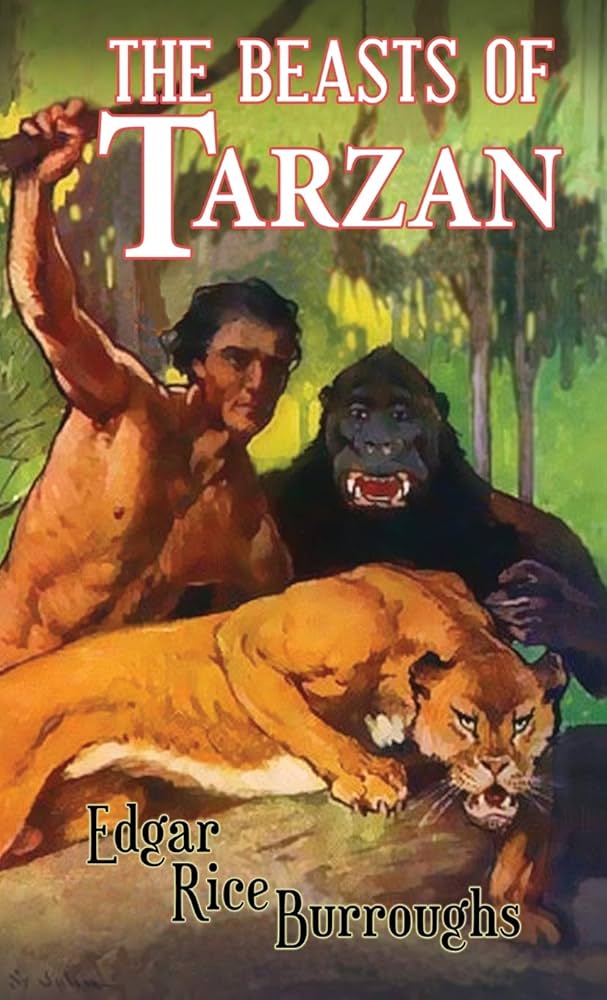Chapter 6 — The beasts of Tarzan
byChapter 6 – The Beasts of Tarzan opens with an unusual sight: a war-canoe gliding over ocean waves, manned not by sailors but by apes, a panther, a native, and Tarzan himself. Their destination lies beyond the reef, but the sea’s fury soon tests their courage. The rolling waters terrify the apes, who react with panic, rocking the canoe and putting them all at risk. Calm is restored only when Tarzan and Akut intervene, displaying calm leadership and silent authority. Gradually, the animals adjust, gripping the canoe’s sides with quiet resolve. It’s a moment that shows not only survival, but adaptation—the ability to push past fear in pursuit of purpose.
As night falls and the shore nears, the canoe is finally capsized, casting its odd crew into the surf. Miraculously, all survive and gather beside a fire lit by Mugambi, their warmth contrasting with the cold ocean they just left. Tarzan and Sheeta then slip into the jungle, sensing an opportunity to hunt. Their pursuit ends with a bull buffalo’s defeat, offering a hard-earned feast. This hunt is more than nourishment—it reaffirms the raw synergy between Tarzan and his beastly allies. Their bond, unshaken by hardship, becomes their greatest strength. In silence, trust flows between them like breath shared in the wild. With renewed energy, the group sets out inland, driven by the trail of Rokoff and the boy.
Along the riverbanks, they search for signs of civilization, hoping to gain news of the enemy’s passage. Villages remain elusive until they cross paths with Kaviri, a tribal chief burdened by recent trauma. His people had suffered at the hands of another white man—Rokoff—who had kidnapped a woman and child. Mistaking Tarzan’s arrival as another threat, Kaviri attempts to launch a preemptive strike. War canoes surge forward, but their resolve crumbles beneath the overwhelming presence of Tarzan’s apes and Sheeta’s fury. A fierce encounter unfolds, ending with Kaviri’s capture and submission.
In captivity, Kaviri listens as Tarzan speaks—not with anger, but with purpose. He learns that Tarzan seeks the same man who wronged his people. The chief, once an enemy, becomes an ally bound by shared pain. He provides information: a white man, woman, and child had passed nearby, reinforcing Tarzan’s deepest fear. Every detail pushes him forward, imagining what horrors his son might face. Rokoff’s path, marked by violence and manipulation, now holds echoes of Tarzan’s own blood. Fueled by urgency, he prepares to press deeper into the wild, drawing strength from every beast, ally, and instinct he commands.
The chapter highlights how alliances in the jungle are born from survival, not diplomacy. Tarzan does not win Kaviri’s support with words, but with action, clarity, and shared cause. It’s a rare moment when two vastly different worlds connect through necessity. Kaviri’s warriors, once prepared to attack, now choose to follow. Trust in the jungle is earned with pain, presence, and purpose—not promises. As the Ugambi narrows ahead, the journey becomes more dangerous. Yet it also becomes more focused, no longer just about justice but family.
For readers, this chapter is a study in transformation—how fear evolves into loyalty, and how bonds with animals, natives, and even enemies emerge under the right circumstances. The primal elements of the story never overshadow its emotional heartbeat: a father fighting to reach his child. Every character serves as a reflection of that devotion, reacting to it, respecting it, and sometimes resisting it. Tarzan, though a figure of strength, is ultimately defined by that emotional vulnerability. His humanity is sharpened by the beasts around him, not buried beneath them. The journey forward promises not just conflict, but reckoning—and it will be shaped by every lesson learned in the dark.

